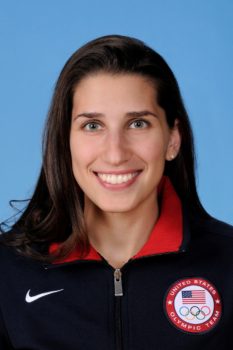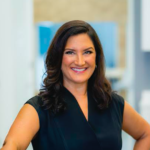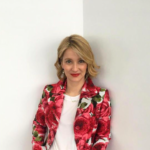Countless people watch “The Princess Bride“ growing up, but countless people do not end up becoming an Olympic fencer after being inspired by the movie. But Nicole Ross did. Nicole and I have been friends since before we were born. Our moms were pregnant together and would take long walks on the Upper West Side. We grew up together and so many of my childhood memories involve Nicole. I don’t see Nicole as often anymore, she is often traveling for competitions, but when we get together it’s somehow like no time has passed. I am so amazed at her talent, drive, and dedication to her sport and job. Get ready to be inspired.
How did you end up as program coordinator for Win4Youth at the Adecco Group?
Adecco Group is an Olympic sponsor, and they have a special program called the Athlete Career and Education Program. This program acts as an initiative to hire Olympians and Olympic hopefuls to help athletes secure meaningful and successful career paths while training, or upon retirement. I worked with a career coach in the program and found a match in my current job with Adecco and Win4Youth.
What are your responsibilities as program coordinator?
A little background – Win4Youth is Adecco Group’s internal philanthropic initiative. Each year a sport is chosen and colleagues, clients, and associates participate in that sport, logging kilometers towards a donation to youth charities around the world.
This year’s sport is triathlon. As program coordinator of Win4Youth in North America, I handle all communications regarding Win4Youth, I manage the social media pages and write for the blog. I also facilitate planning and organizing events. It’s a role where I get to work with many different branches of the company and respond to a lot of ad hoc requests.
What is your favorite thing about working at Adecco Group?
The best part about my job is that, at the end of the day, I know the work I do helps facilitate a charitable donation to kids in need. That really motivates me to be thorough in my work and take pride in all my tasks, no matter how large or small they may be.
In addition, because I am a training athlete, my job is completely remote, I work exclusively from home or the road. This flexibility is really ideal for pursuing my passions and getting better at my sport.
You are also a professional fencer. You went to the Olympics in 2012 and compete around the world. What was your fencing and academic experience like growing up?
Being an athlete and student certainly taught me to multitask effectively! I started fencing when I was nine years old, so I don’t even remember a time in school where I wasn’t constantly practicing or traveling. From a young age, my parents were firm in the belief that doing well and succeeding in school always came first. There’s no cheat sheet for this – I basically just worked my butt off through all of high school and college in order to get good grades while traveling.
My junior year of high school, I missed 40 days of school! I wrote a lot of papers on airplanes, and even took a final exam for college environmental science in a hotel room in South Korea, proctored by my coach! Having to juggle two important goals in my life – fencing and school – made me tougher and unafraid to have a lot on my plate at one time.
What inspired you to start fencing?
I loved the movie “The Princess Bride.” There’s a lot of great theatrical fencing scenes and apparently, that got me interested in fencing. I still love the movie, although now I know that kind of fencing is totally different than modern fencing!
Why fencing? What about fencing made you fall in love with the sport?
Fencing is such a multifaceted sport. You have to have a mastery over so many different aspects of yourself and your opponent in order to be good. Contrary to popular belief, it’s extremely athletic and physically demanding. Agility, speed, power, technical footwork, and a lot of constant movement are all essential.
At the same time, the mental side of fencing is equally as important. Reading your opponent and keeping your own emotions and mental state in check while executing all of the physical things you have to do to score makes it challenging and fascinating to me. Also, anyone can beat anyone in fencing. It’s not like some other sports where if you train the “right” way then you know you’re going to win the race. There’s the constant uncertainty and unknown in fencing that makes it exciting.
What is your current training and competition schedule like?
Right now, we are at the tail end of the Olympic Qualifying season for the Olympic Games in Rio this summer. My schedule is the most demanding it ever gets: I train roughly five days a week and compete internationally about every three weeks. My next competition is in Havana, Cuba on March 12th. But this season I’ve been to Germany, China, Russia, Canada, Mexico, Italy, France, and Poland, all for competitions.
What is a day as Nicole like? Please walk me through a day!
Every day is different! But an example would be: Wake up around 9 am (I’m not an early riser so this feels early to me!) and work from home answering emails, participating in conference calls, writing communications, and managing projects for Adecco. Around mid-day or late morning, I’ll do a “first practice.” That’s a physical workout. Some days that’s a lift in the gym, other days I’ll take a spinning class, or I’ll set up my own drills with an agility ladder and core work in the fencing room. I’ll eat a late lunch, and then either assist with teaching a fencing class or do rehab with my physical therapist in midtown. “Second practice” starts around 6 pm my club, The Fencers Club. I’ll do drills and bouting with opponents until about 8 pm. I get home at 8:30 or 9 pm and cook dinner with my boyfriend, Soren, or we’ll eat out. Around 10 pm we’re both on the couch, choosing a Netflix movie and working on some last-minute emails and work. I usually get to bed around midnight.
What has been the proudest moment in your fencing career so far?
Recently, I made a breakthrough and finally finished in the top eight at a World Cup during the qualifying season. I had been feeling down about my performance in general and was thinking about retiring early. I went into the competition knowing it might be my last and came out with my highest result to date. I had to upset the #1 fencer in the world to get there – I was most proud of myself for battling through a tough time and continuing to believe in myself.
I’m also always feeling pride in my teammates and our team (fencing has a team event too). Every time I fence alongside them, I learn something from them and am inspired by what they can do. Upsetting Italy, the #1 team in the world, last season, and finishing in second place was a moment I’m most proud of us for.
What advice do you have for other professional athletes (or people who hope to be professional athletes one day)?
I would say try to keep things in perspective. In the career of any athlete, there are going to be lots of ups and downs. Being able to weather the storms and keep at it is key. I’ve learned over the years to let less get to me, and focus on the big picture more.
Oh, also, another piece of advice: Go to practice, especially when you don’t feel like it. And stretch, a lot.
What was your favorite moment from the Olympics?
It’s hard to narrow it down to just one! I didn’t get to walk in opening ceremonies because I was competing early the next morning, but I did participate in closing ceremonies and that was unreal and emotional – I remember walking out into the stadium with my teammates surrounding me – all the tension and stress from the two weeks was gone because we were done competing. There was this white confetti falling, and you walked out into the stadium with thousands of cheering people in the stands. It felt like the best reward at the end of a long journey. I definitely had tears in my eyes!
What is your morning routine?
As I mentioned earlier, I’m not really a morning person so getting started on the day can sometimes be a challenge. I wake myself up with two kinds of tea – English breakfast with milk and honey for some caffeine, and a blend of Echinacea and Goldenseal that I make myself and call “health tea.” I’m a little obsessive about staying healthy and boosting my immune system, especially during the winter months. Because I work from home, I get to dress down in athletic clothes, and I don’t ever wear makeup during the day. I wash my face with Neutrogena Oil-Free Acne Wash and use a light layer of Kiehl’s Ultra facial cream to hydrate my skin. Pretty simple!
What are you reading right now?
I love reading books (not on a Kindle, eReader, or iPad), and I feel like my life is so much richer when I’m immersed in good literature. Right now, I’m on the fourth and last book of the Neapolitan Novel series by Elena Ferrante, The Story of the Lost Child. I also just started In the Heart of the Sea.
In addition, I’m reading a quasi-textbook for coursework (in preparation for a career switch to teaching next year) called How to Teach Like A Champion 2.0. I was expecting something dry, but I’m actually greatly enjoying learning about techniques I may implement in my classroom next year.
What is your best advice for other young professional women?
My advice would be to expect to sometimes be uncomfortable and to be ok with that. I think it’s unreasonable to expect that you’ll find your perfect career right away; most often it takes trial and error. It’s that way for me, and I’m still undergoing that process. I worked in finance in 2013 and 2014 and, although I found it wasn’t what I wanted to do long term, I’m so glad I took a chance and did something outside of my comfort zone. My experiences and the skills I gained through that job have helped me in countless ways. So don’t sweat it if you’re not exactly where you want to be right now, it’s a process!
What is the best advice you’ve ever received?
Probably any piece of advice my dad has ever given me. He’s pretty wise. He’s got a great perspective on life, and he has a way of knowing what’s most important in the long run.
Other than that, it’s: Trust yourself. Usually, you’re the one who has the answer.


































17 Responses to Career Profile: Nicole Ross, USA Fencing and Adecco Group